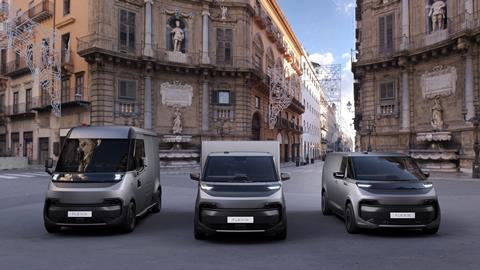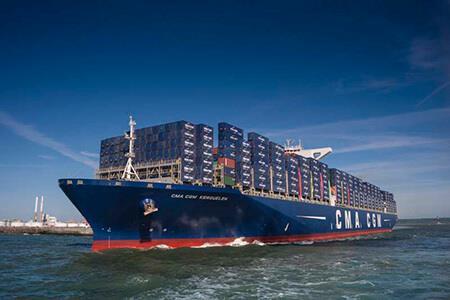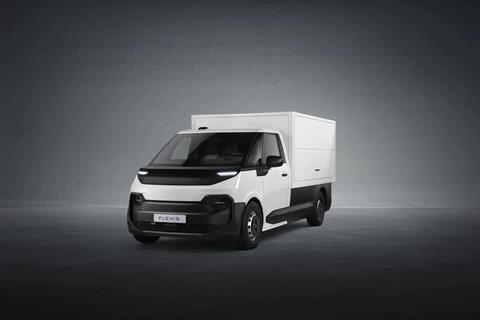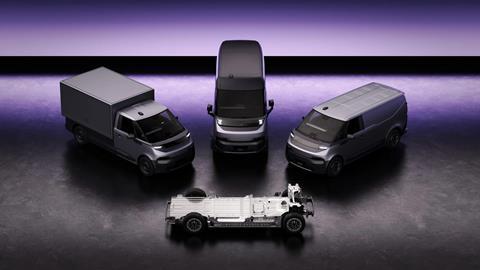Flexis, a joint venture between Renault Group, Volvo Group and CMA CGM, has unveiled its new range of electric light commercial vehicles; three models all sharing a skateboard platform. Scheduled to begin production this year, the company is making use of its logistics expertise through a dedicated localisation strategy in Europe. Automotive Logistics reports from the Flexis headquarters in Paris.
Flexis was formed in October 2023 when Renault, Volvo, and logistics provider CMA CGM signed a non-binding agreement on the electric van joint venture (JV). The two OEMs, holding 45% stakes each, both initially agreed to invest €300m ($313m), while CMA CGM said it would invest €120m ($125m) for the remaining 10% of the business. With the initial investment of €1 billion, including €360m already committed, the company is set to begin series production in mid-2025.

Strategically based in Renault’s home nation of France, the JV is making use of the carmaker’s Sandouville plant which has specialised in the production of light commercial vehicles (LCVs) since 2014.
While only in its infancy, Flexis is ready to showcase its three new models of electric vans – the Step-In van, the Cargo van, and the Panel van – all of which will share Flexis’ native skateboard platform. In sharing the platform, the company is aiming to keep costs at a minimum, optimise resiliency and enhance efficiency. And the shared platform enables the company to build a strong regional production and supplier network, leveraging the JV partners’ existing networks.
European nearshoring and battery localisation: A ready-made supply chain
Flexis is building its supply chain with a European focus through a dedicated localisation strategy, aiming to improve industrial agility while reducing emissions.
Its CEO, Philippe Divry (previously senior vice-president of group trucks strategy at Volvo Group), speaks to Automotive Logistics about the battery localisation strategy at the launch of the three models in Paris.
“We are the best of both worlds. We have the flexibility and the agility of a smaller company, but we are able to leverage all the capabilities that our founding parents have,” - Philippe Divry, CEO, Flexis
“We will have two sizes of batteries, one with normal range and one with a long range, with two different chemistries” he says. “They will both have two different suppliers, but both of them are located in Europe.”
The battery cells will be produced within the continent and assembled within the Flexis plant.

Divry adds: “The whole supply chain will mostly be in Europe, which is very good for our industrial reactivity and for the carbon footprint. Batteries will be produced in Europe, and of course we are using the parent companies’ supply chain and their suppliers and vendors.”
He says that some of the suppliers will even move to set up operations within the Flexis factory, or move closer to the factory, to enhance that localisation. “We want to completely optimise the supply chain.”
This nearshoring approach in Europe is designed to mitigate supply chain disruptions while ensuring that critical components, including batteries, remain within a well-controlled regional ecosystem. In having the heavy batteries travel shorter distances, it will also help Flexis keep logistics costs to a minimum.
Divry says that the firm may look to expand its reach globally in the future, but that Europe will remain the focus for now.
“We know that when you start to scatter your efforts you may fail, so we want to first succeed in Europe,” he says. “We have designed the vehicle so that the platform can later evolve to fit the demands of other continents, but first we want to make sure that we are well on track in Europe.”
CMA CGM’s growing strategic influence on European automotive supply chains
As a worldwide shipping company founded in France in the 70s, CMA CGM has been growing and gaining more market share and control over the European automotive supply chain in recent years.
The logistics firm acquired Ceva Logistics in 2019 as part of its “ambitious transformation plan to serve customers with world-class logistics services”.

Three years later, it bought out French logistics provider Gefco and incorporated it into Ceva, helping it lift revenues by $750m in just one quarter. The integration of Gefco significantly enhanced CMA CGM’s ability (through Ceva) to provide FVL services in Europe, through Gefco’s 3,000 rail wagons and 30 vehicle compounds across the region dedicated to moving vehicles.
Just last year, CMA CGM acquired Bolloré Logistics for €4.85 billion ($5.24 billion) and absorbed it into the Ceva Logistics division, adding scale in air and ocean freight services.
Under its ownership by CMA CGM, Ceva has also added Ingram Micro’s CLS division in the ecommerce sector, Cargex in perishable cargo, and Colis Privé in small parcel deliveries.
The company has also been forming partnerships to help decarbonise logistics and improve digitalisation. In 2019, along with Mediterranean Shipping Company (MSC), it joined the TradeLens digital business platform, a service based on blockchain technology to help provide secure shipping data and make global trade more efficient. In 2023, it formed a collaborative partnership with Maersk to drive decarbonisation in shipping using alternative fuels.
CMA CGM expanded its sustainable trucking services last year by introducing 11 new rail services and new green truck services in countries across Europe, moving 1.8m TEU in the year.
In expanding its services across the continent, and following in the trend of acquisitions within logistics providers, CMA CGM is opening up an extensive, ready-made supply chain network to Flexis.
Cost savings through a shared EV platform and streamlined supply chains
Flexis’ vehicle design is built on a shared skateboard platform, featuring an 800V battery system and rear-motor configuration. In supporting all three of its models, the modularity of the platform allows for cost efficiencies in production.
By standardising core vehicle components, the company reduces complexity in manufacturing and supply chain management.

Coupled with economies of scale from its parent companies, this helps drive down production costs while maintaining high vehicle adaptability.
“We are the best of both worlds. We have the flexibility and the agility of a smaller company, but we are able to leverage all the capabilities that our founding parents have,” Divry says. “That makes us much more able to deliver and execute with this balance.”
Krishnan Sundararajan, COO, Flexis says that this will pay off in competitive pricing of the vehicles. “Because we have the high-volume platform, that allows us to make three models on the same platform, it has a high degree of commonality in parts, which will make the price extremely competitive,” he says. “We are also using all the sourcing and purchasing power of our parent companies for suppliers, so we’re leveraging their supply chains.”
Digital fleet management: Enhancing efficiency in electric logistics
Of course, as Flexis is LCV-centred, it not only has to focus on the logistics of making and delivering its vehicles, but also on their future logistics performance as a fleet. So far, Flexis has ten letters of intent (LoIs) for 15,000 vehicles. Among those customers are Colis Drivé, a subsidiary of CMA CGM, DB Schenker, and new UK-based logistics firm Hived. As well as selling these vehicles under the Flexis brand, the company will also supply vehicles to Renault, and Renault Trucks which is part of the Volvo Group. These two companies will market and distribute the vehicles through their own network, under their own brands.
To ensure performance as a logistics vehicle throughout its lifecycle, Flexis is pioneering a Software-Defined Vehicle (SDV) architecture that enables real-time connectivity, predictive maintenance, and fleet management insights. The system, developed in partnership with Renault’s Ampere division, Google, Qualcomm, and Valeo, transforms each vehicle into an advanced digital asset within the logistics chain.

Through real-time data analytics and over-the-air updates, fleet operators can monitor battery health, adjust vehicle settings for efficiency, and optimise route planning. Additionally, the company’s fleet management platform offers modular, pay-per-use service subscriptions, allowing logistics providers to tailor their digital infrastructure while controlling operational costs.
Flexis’ advanced battery lifecycle monitoring system provides detailed insights into battery performance, usage patterns and degradation rates. Fleet managers can make data-driven decisions on whether to extend battery life, replace unit, or optimise resale value based on real-time diagnostics.
This proactive approach to battery management is a critical factor in reducing the total cost of ownership for logistics firms, particularly as the transition to electric vehicles accelerates. The system also supports broader energy management strategies, allowing fleet operators to integrate vehicle energy use with other sustainability initiatives.
Pierre Sirolli, head of services and solutions at Flexis says the company will also be collaborating with yet-to-be-named external software partners to continuously improve its vehicle software and digitalisation. “We cannot do everything by ourselves, we are humble enough to say that,” he says. “We are working with big players and leaders in the market to ensure that we have the best solution, and the way we want to address the market is to really take the best of everybody, aggregate it, and execute it.”
A scalable blueprint for sustainable urban EV logistics
Flexis is combining nearshoring, digitalisation, shared platforms, and cost-conscious electrification to create a scalable and sustainable model for urban logistics. By integrating regional supply chains, intelligent fleet management, and EV platform standardisation, the company is aiming to not only advance vehicle technology but also reshape the logistics ecosystem for a more efficient and environmentally sustainable future.
As automotive manufacturers and logistics firms navigate supply chain volatility and regulatory pressures, Flexis’ approach offers a compelling blueprint for achieving cost-effective, data-driven, and localised electric fleet operations.
Topics
- Battery Supply Chain
- Cost & Budget Management
- Customer Experience
- Data Integration & Interoperability
- Digitalisation
- Editor's pick
- Electric Vehicles
- Europe
- EV & Battery Production
- features
- Finished Vehicle Logistics
- Inbound Logistics
- Inventory & Demand Forecasting
- Lean Logistics
- Lean Transformation
- Logistics IT
- Logistics Management
- Logistics service provider
- Nearshoring
- Nearshoring Strategies
- OEMs
- Renault
- Road
- Service Part Logistics
- Suppliers
- Supply Chain Optimisation
- Supply Chain Planning
- Supply Chain Purchasing
- Support & Maintenance
- Sustainability
- Sustainable Supply Chain Design
- Technology Integration
- Technology service providers
- Volvo Group


























![Global[1]](https://d3n5uof8vony13.cloudfront.net/Pictures/web/a/d/s/global1_726550.svgz)














No comments yet